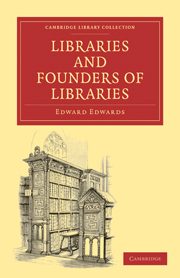Book contents
- Frontmatter
- PREFACE
- Contents
- LIBRARIES, AND THE FOUNDERS OF LIBRARIES
- CHAPTER I INTRODUCTORY.—THE ANCIENT LIBRARIES OF EGYPT, OF JUDÆA, OF GREECE, AND OF THE ROMAN EMPIRE
- CHAPTER II INTRODUCTORY. — MEDIÆVAL AND MODERN LIBRARIES. — ANTICIPATORY SURVEY OF THE SUBJECT, IN GENERAL
- CHAPTER III OF SOME LIBRARIES OF MONASTERIES ABROAD
- CHAPTER IV OF SOME LIBRARIES OF MONASTERIES AT HOME
- CHAPTER V CONCERNING THE LIBRARIES OF SOME FAMOUS AUTHORS, OF VARIOUS PERIODS
- CHAPTER VI CONCERNING THE LIBRARIES OF SOME CELEBRATED MONARCHS AND ROYAL PERSONAGES, OF VARIOUS PERIODS
- CHAPTER VII HISTORY OF THE OLD ROYAL LIBRARY OF THE KINGS OF ENGLAND
- CHAPTER VIII HISTORY OF THE STATE PAPER OFFICE
- CHAPTER IX HISTORY OF THE PUBLIC RECORDS OF THE REALM, IN THEIR EARLY PERIOD OF GROWTH AND SEPARATE CUSTODY
- CHAPTER X THE LIFE OF THOMAS PARKER, EARL OF MACCLESFIELD.—THE LIFE OF NICHOLAS JOSEPH FOUCAULT.—HISTORY AND DESCRIPTION OF THE LIBRARY AT SHIRBURN CASTLE IN OXFORDSHIRE
- CHAPTER XI THE LIFE OF CHARLES SPENCER, THIRD EARL OF SUNDERLAND. — HISTORY AND DESCRIPTION OF THE LIBRARY AT BLENHEIM PALACE
- CHAPTER XII THE PUBLIC LIFE OF GEORGE JOHN, SECOND EARL SPENCER.—HISTORY AND DESCRIPTION OF THE SPENCER LIBRARY AT ALTHORP
- APPENDIX A LIST AND DESCRIPTION OF EXTANT CATALOGUES OF ENGLISH MONASTIC LIBRARIES, DISTINGUISHING THE UNPRINTED FROM THE PRINTED
- APPENDIX B NOTE ON THE LIBRARY OF KING EDWARD THE SIXTH
- APPENDIX C SUMMARY CLASSIFICATION AND SYNOPTICAL VIEW OF THE PUBLIC RECORDS OF THE REALM
- Plate section
CHAPTER XI - THE LIFE OF CHARLES SPENCER, THIRD EARL OF SUNDERLAND. — HISTORY AND DESCRIPTION OF THE LIBRARY AT BLENHEIM PALACE
Published online by Cambridge University Press: 10 November 2010
- Frontmatter
- PREFACE
- Contents
- LIBRARIES, AND THE FOUNDERS OF LIBRARIES
- CHAPTER I INTRODUCTORY.—THE ANCIENT LIBRARIES OF EGYPT, OF JUDÆA, OF GREECE, AND OF THE ROMAN EMPIRE
- CHAPTER II INTRODUCTORY. — MEDIÆVAL AND MODERN LIBRARIES. — ANTICIPATORY SURVEY OF THE SUBJECT, IN GENERAL
- CHAPTER III OF SOME LIBRARIES OF MONASTERIES ABROAD
- CHAPTER IV OF SOME LIBRARIES OF MONASTERIES AT HOME
- CHAPTER V CONCERNING THE LIBRARIES OF SOME FAMOUS AUTHORS, OF VARIOUS PERIODS
- CHAPTER VI CONCERNING THE LIBRARIES OF SOME CELEBRATED MONARCHS AND ROYAL PERSONAGES, OF VARIOUS PERIODS
- CHAPTER VII HISTORY OF THE OLD ROYAL LIBRARY OF THE KINGS OF ENGLAND
- CHAPTER VIII HISTORY OF THE STATE PAPER OFFICE
- CHAPTER IX HISTORY OF THE PUBLIC RECORDS OF THE REALM, IN THEIR EARLY PERIOD OF GROWTH AND SEPARATE CUSTODY
- CHAPTER X THE LIFE OF THOMAS PARKER, EARL OF MACCLESFIELD.—THE LIFE OF NICHOLAS JOSEPH FOUCAULT.—HISTORY AND DESCRIPTION OF THE LIBRARY AT SHIRBURN CASTLE IN OXFORDSHIRE
- CHAPTER XI THE LIFE OF CHARLES SPENCER, THIRD EARL OF SUNDERLAND. — HISTORY AND DESCRIPTION OF THE LIBRARY AT BLENHEIM PALACE
- CHAPTER XII THE PUBLIC LIFE OF GEORGE JOHN, SECOND EARL SPENCER.—HISTORY AND DESCRIPTION OF THE SPENCER LIBRARY AT ALTHORP
- APPENDIX A LIST AND DESCRIPTION OF EXTANT CATALOGUES OF ENGLISH MONASTIC LIBRARIES, DISTINGUISHING THE UNPRINTED FROM THE PRINTED
- APPENDIX B NOTE ON THE LIBRARY OF KING EDWARD THE SIXTH
- APPENDIX C SUMMARY CLASSIFICATION AND SYNOPTICAL VIEW OF THE PUBLIC RECORDS OF THE REALM
- Plate section
Summary
Andrew. Unload part of the Library, and make room
For th' other dozen of carts ; I'll strait be with you.
Cook. Why, hath he more books?
And. More than ten marts send over.
Butler. And can he tell their names?
And. Their names! He has 'em
As perfect as his Pater Noster. But that's nothing;
If all thy pipes of wine were filled with books,
Made of the barks of trees, or mysteries writ
In old moth-eaten vellum, he would sip thy cellar
Quite dry, and still be thirsty.—
The Elder Brother, Act I, Scene ii.Like his almost life-long rival Robert Harley, Charles Spencer, third Earl of Sunderland, had an equally ardent passion for literature, and for the glorious strife of statesmanship. No man knew better how to enjoy and how to dignify retirement, and very few men have wrestled more strenuously to avoid it. Nearly twelve years of his short life were passed in high offices of State, and almost the half of that official period was spent under Queen Anne, who mortally hated him. The other half embraced those early years of the next reign, in which the contests of politicians too often resembled the combats of those ancient Retiarii who fought with nets, as well as with sharp-pointed weapons.
Charles Spencer was the second but only surviving son of Robert, second Earl of Sunderland, and fourth Lord Spencer of Wormleighton, by the Lady Anne Digby.
- Type
- Chapter
- Information
- Libraries and Founders of Libraries , pp. 368 - 391Publisher: Cambridge University PressPrint publication year: 2010First published in: 1864



